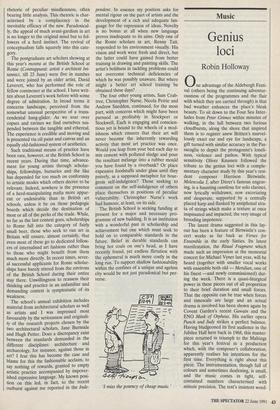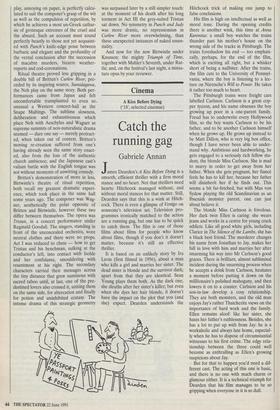Mu s ic
Genius loci
Robin Holloway
One advantage of the Aldeburgh Festi- val (others being the continuing adventur- ousness of the programmes and the flair with which they are carried through) is that bad weather enhances the place's bleak beauty. To sit down to the Four Sea Inter- ludes from Peter Grimes within minutes of walking, in the lull between two furious cloudbursts, along the shore that inspired them is to register anew Britten's marvel- lously exact ear and eye for landscape, a gift turned with similar accuracy in the Pas- sacaglia to depict the protagonist's loneli- ness, violence and pathos. With typical sensitivity Oliver Knussen followed the tribute to the genius loci with a comple- mentary character study by this year's resi- dent composer Harrison Birtwistle. Melencolia I, after Diirer's famous engrav- ing, is a haunting cantilena for solo clarinet, now lyrically withdrawn, now excoriating and desperate, supported by a centrally placed harp and flanked by antiphonal stra- ta of strings which make a texture at once inspissated and impacted, the very image of brooding impotence.
The latent drama suggested in this lay- out has been a feature of Birtwistle's con- cert works as far back as Verses for Ensemble in the early Sixties. Its latest manifestation, the Ritual Fragment which made such an impression at the memorial concert for Michael Vyner last year, will be heard (together with smaller vocal works with ensemble both old — Meridian, one of his finest —and newly commissioned) dur- ing the week. There is a quasi-liturgical power in these pieces out of all proportion to their brief duration and small forces. That the opposite can be true when forces and timescale are large and an actual drama is involved has been shown again by Covent Garden's recent Gawain and the ENO Mask of Orpheus. His earlier opera Punch and Judy strikes a perfect balance. Having bludgeoned its first audience in the Jubilee Hall here back in 1968, this master- piece returned in triumph to the Maltings for this year's festival in a production which, with the composer's collaboration, apparently realises his intentions for the first time. Everything is right about this piece. The instrumentation, though full of colours and sometimes deafening, is small, and the music comes in tight, self- contained numbers characterised with minute precision. The text's insistent word- play, annoying on paper, is perfectly calcu- lated to suit the composer's grasp of the wit as well as the compulsion of repetition, by which he achieves a most un-Greek cathar- sis of grotesque extremes of the cruel and the absurd. Such an account must sound perfectly beastly to those not yet acquaint- ed with Punch's knife-edge poise between barbaric and elegant and the profundity of the vernal conclusion after the succession of macabre murders, bizarre weather- reports and cod-coronations.
Ritual theatre proved less gripping in a double bill of Britten's Curlew River, pre- ceded by its inspiring source, Sumidagawa, the Noh play on the same story. Both per- formances came from Japan and felt uncomfortable transplanted to even so. unusual a Western concert-hall as the Snape Maltings. The sublime slowness, deliberation and exhaustiveness which place Noh with Aeschylus and Wagner as supreme summits of non-naturalistic drama seemed — dare one say — merely protract- ed, when taken out of context. Britten's moving re-creation suffered from one's having already seen the same story enact- ed, also from the loss of the authentic church ambience; and the Japanese cast's valiant battle with the English tongue was not without moments of unwitting comedy.
Britten's demonstration of more in less, Birtwistle's theatre of ritual repetition, both recall my greatest dramatic experi- ence, which took place in the same hall some years ago. The composer was Wag- ner, aesthetically the polar opposite of Britten and Birtwistle, however these two differ between themselves. The opera was Tristan, in a concert performance under Reginald Goodall. The singers, standing in front of the unconcealed orchestra, wore neutral clothes and there were no props. Act I was reduced to chess — how to get Tristan and his henchman, sulking at the conductor's left, into contact with Isolde and her confidante, smouldering with resentment at his right. The secondary characters carried their messages across the tiny distance that grew numinous with sacred taboo until, at last, one of the pre- destined lovers also crossed it, uniting them on the same side, for altercation and finally for potion and uninhibited ecstasy. The intense drama of this strategic geometry was surpassed later by a still simpler touch: at the moment of his death after his long torment in Act III the grey-suited Tristan sat down. No symmetry in Punch and Judy was more drastic, no repressionism in Curlew River more overwhelming, than these unexpected instances of naked essen- tiality.
And now for the new Birtwistle under Knussen; the mighty Triumph of Time, together with Mahler's Seventh, under Rat- tle; and, on the festival's last night, a minia- ture opus by your reviewer.



























































 Previous page
Previous page